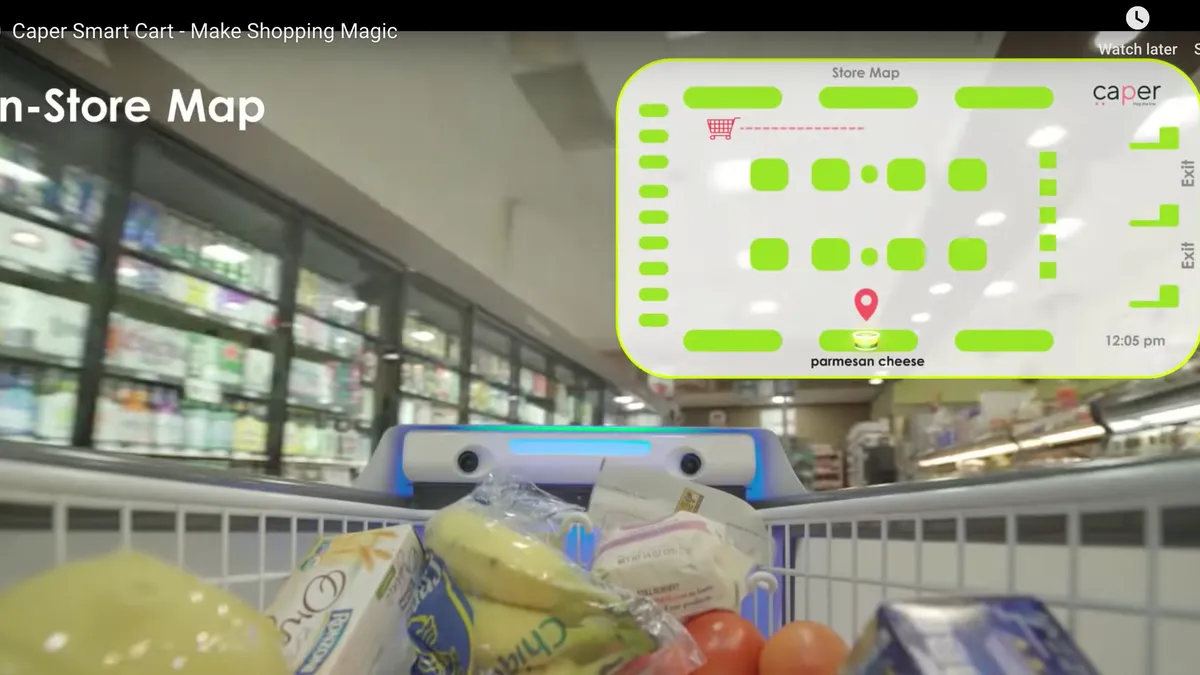Dive Brief:
- The startup behind the first AI-powered shopping cart announced $3.5 million in funding to date from investors including Plated co-founder Nick Taranto and Instacart co-founder Max Mullen, according to a release. Caper plans to use the cash to expand its client list and build a handheld shopping basket with similar tech, TechCrunch reported.
- Customers scan an item through a screen on the front of the cart, called Caper, and toss into the basket. Sensors also detect the cart's weight and tally products in a virtual basket, while the screen highlights in-store deals or complementary items. When done shopping, customers pay through a card reader installed on the cart itself, skipping the checkout line.
- Two grocery chains currently use Caper's carts, which has increased basket size by an average 18% according to the release, with another 150 stores on the docket for 2019. Though the current version requires scanning, deepening the system's learning algorithm, Caper hopes to eventually roll out a scan-free, drop-and-go cart.
Dive Insight:
Consumers could adapt more easily to Caper's shopping cart than the walk-in, walk-out technology burgeoning from Amazon Go and others. The cart's system also offers an essential element the grab-and-go mentality ignores: on-the-spot promotions. In addition to moving cashiers to floor specialists ready to assist customers, Caper also hopes its data collection will convince retailers to use its technology.
For one, Caper knows exactly where customers travel in the store, how long they spend in front of a shelf and which items they pick up and put down. The screen hinged to the front of the cart also displays deals on products near the customer's current location or a complementary item to one just picked up, TechCrunch reported.
Caper wants to help retailers progress their digital convenience offerings without completely overhauling existing stores. The press release mentions the high costs for overhead cameras and sensors, as Amazon Go stores deploy, and the need for retailers to catch up with frictionless retail experiences.
Other tech companies have already dug in their heels to develop grab-and-go technology based on sensor technology, including Grabango led by Pandora’s former CTO, Zippin and Inokyo. Another autonomous retail startup, Standard Cognition, opened its doors in San Francisco before Amazon and has garnered more than $40 million in funding, according to TechCrunch. Ads for these technologies depict spacious stores, low on crowds, where customers enter and exit through a subway-like turnstile. Inokyo skips that process, instead asking customers to download an app and attach a credit card, but even the TechCrunch reporter felt a bit like he was stealing.
There is definitely a learning curve inherent in these grab-and-go concepts, which could restrict them from going mainstream. So far only Amazon has reached outside Silicon Valley, so Caper could catch more clients with the help of this recent funding round. The cart system also presents a new technology in familiar fashion — a win for consumers slow to embrace unfamiliar tech and for those who frown upon cumbersome apps.
Caper's website lists six East Coast chains as partners — Key Food, Pioneer and CTown, as well as three smaller stores with a couple locations — but only two officially use the carts, according to the press release. The companies were not named. Co-founder and CEO Lindon Gao told TechCrunch that he sees retail as “severely under-innovated.” Consumers can book a hotel room or flight and order cabs or food from their phones, he said, but at stores, they still must wait in line.
Gao wouldn't reveal the cost of each cart to TechCrunch, but he insisted it doesn't differ greatly from a standard shopping cart. He compared the overall investment to the installation of self-checkout kiosks. For now, existing and future clients will buy the carts and pay a subscription fee to receive hardware updates.












